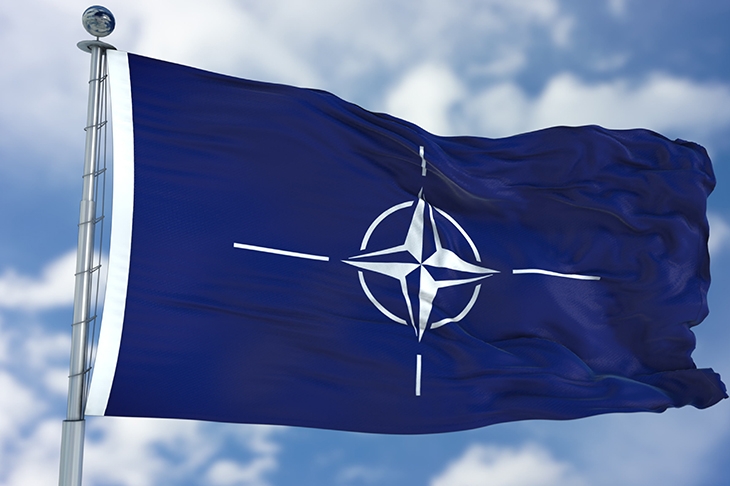Nigel’s nakedness
Sir: Rod Liddle is right to be wary of the hubris that Nigel Farage, the Brexit party leader, is beginning to show (‘The Brexit party delusion’, 18 May). His wish to smash the mould of British politics clearly shows that he expects his disciples to follow him into the promised land. The Andrew Marr interview and a recent Question Time appearance showed that under close questioning Farage gets rattled and resorts to dismissing his opponents and shouting them down. When will the public realise that this emperor has no clothes?
Stan Labovitch
Windsor, Berks
Nato expansion
Sir: Alan Judd writes of the ‘allegedly broken promise not to enlarge Nato following the collapse of the Soviet Union’ (‘Disputes over Putin’, 18 May). Well, the promise, if given, has certainly been broken, as Nato’s current borders show.
The only remaining question is whether such promises were made. And they were. The question was resolved by the publication of declassified US, Soviet, German, British and French documents by the National Security Archive at George Washington University in December 2017, fully reported by the National Interest. These reveal clearly that the promises were repeatedly made, in broad terms which mean they are still applicable. Our foreign policy towards Russia would be far more effective if we acknowledged such things more readily.
Peter Hitchens
London W8
Educational resources
Sir: I am surprised your leading article suggests we should be angry about the fact that the poorest pupils in our schools get the worst exam results, considering that the main focus in education for years has been on ‘closing the gap’ between well-off and poor children. Substantially more time and money is spent on the latter (‘Mind the gap’, 18 May). It does seem reasonable, however, to ask why there is so little improvement given the efforts which have been made. A report by the Education Policy Institute in 2017 found that the gap in attainment has widened since 2007, ‘despite considerable investment and targeted intervention programmes by the government’. The response is always that we must spend more money. However, it could be argued that if we devoted the same resources to the best-performing children, they might grow up to solve some of our other current fixations: climate change for example.
Derinda Marston
Bromsgrove, Worcestershire
Chimp talk
Sir: The musician and animal rights activist Moby gives us a glimpse of life with A-list celebrities, letting us in on his cosy time with ‘the beautiful, erudite, vegan and fluent in gorilla’ Dr Jane Goodall, along with Leo DiCaprio (‘The ideal brunch’, 4 May).
Dr Goodall has spent her entire working life studying and raising awareness of chimpanzees. Gorillas and chimps are different; but perhaps distinctions between higher primates are irrelevant in LA.
Reggie Heyworth
Director, Cotswold Wildlife Park
Burford, Oxfordshire
Hacking meters
Sir: Martin Vander Weyer is right to flag up Huawei’s possible insecurity against sabotage (Any other business, 11 May) but this hypothetical situation is trumped by the real vulnerability of the electricity supply because of the introduction of smart meters. These are programmed so that suppliers can switch them off. Were this to happen to a large number at once because the software was hacked, there would be a power surge in the national grid of up to 15 per cent. A change in demand of 1 per cent is sufficient to cause problems — and as all the hacked meters could be switched back on again there is a double risk. Such a demand change would take the grid down and potentially it could be years before a full network could be restored. If government takes any sensible action against hacking — and the advice it appears to be getting is contradictory — it should remove the ability of suppliers to switch off smart meters.
Dr Andrew Bamji
Rye, E. Sussex
Three kings
Sir: Regarding pub names, there is a partial reference to Edward VIII (Notes on…, 18 May) in our local, the King’s Head in South Belfast. To celebrate the opening of the King’s Hall, a statue was commissioned of George V. However, 1936 became the year of the three kings and the original statue was given the new head of Edward VIII. Then by the year end that had to be replaced too, with George VI. Hence the King’s Head got its name. Time has blended the statue’s stonework beautifully, as well as the beer.
Ian Elliott
Belfast
A cleaned-up Clyde
Sir: Ross Clark’s article (‘Clearing the air’, 18 May) came on the heels of my daughter telling me that from her office window she sees a cormorant nesting — on the Clyde in the centre of Glasgow. She had no idea that not long ago the idea of wildlife living in or on the river would have been unthinkable. There is indeed a national assumption that pollution is getting worse. Would it harm us to appreciate progress when it happens?
Sue Rose
Edinburgh
Beeb leanings
Sir: John Morrison (Letters, 18 May) takes Rod Liddle to task for inferring the BBC has a left-wing bias, by naming former BBC employees who have become Tory parliamentarians and associated scriptwriters. He fails to mention that they only exhibited their right-wing tendencies after leaving the BBC.
George Kelly
Maids Moreton, Bucks






Comments